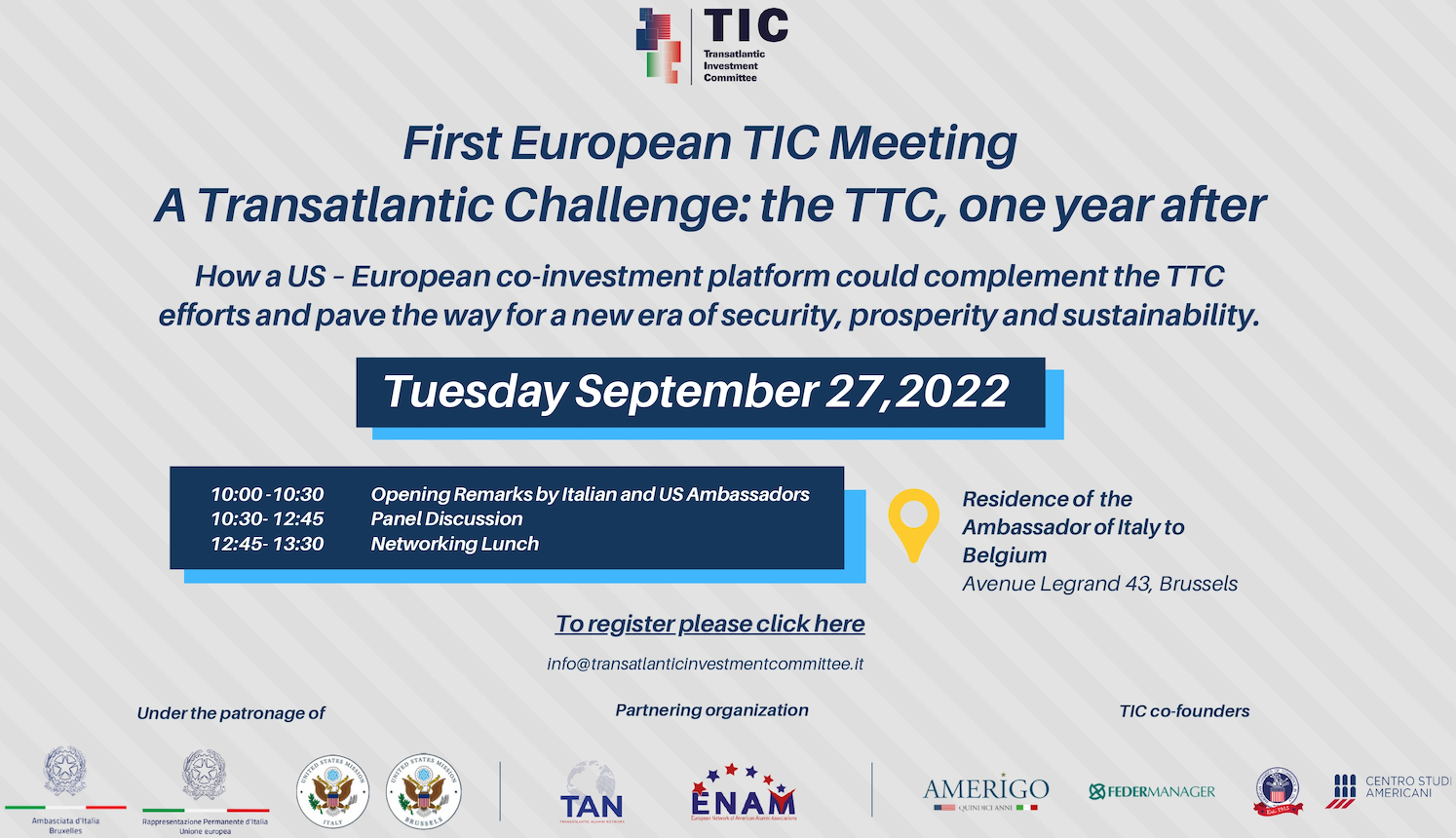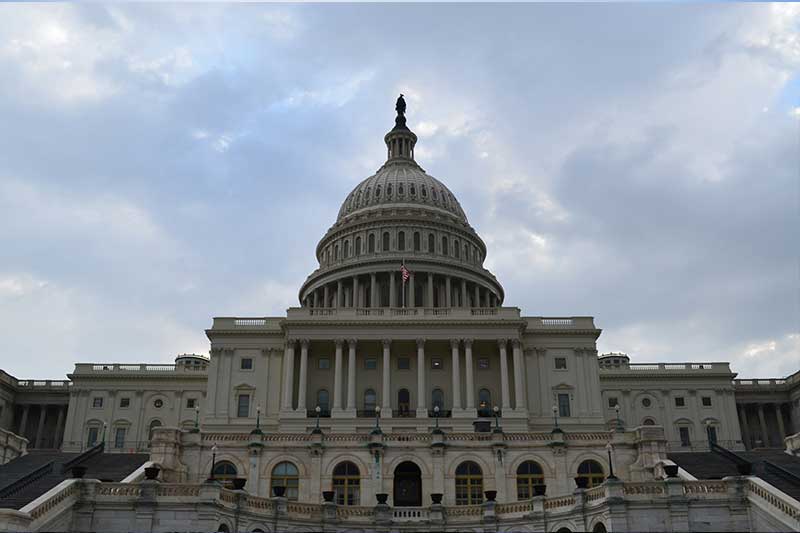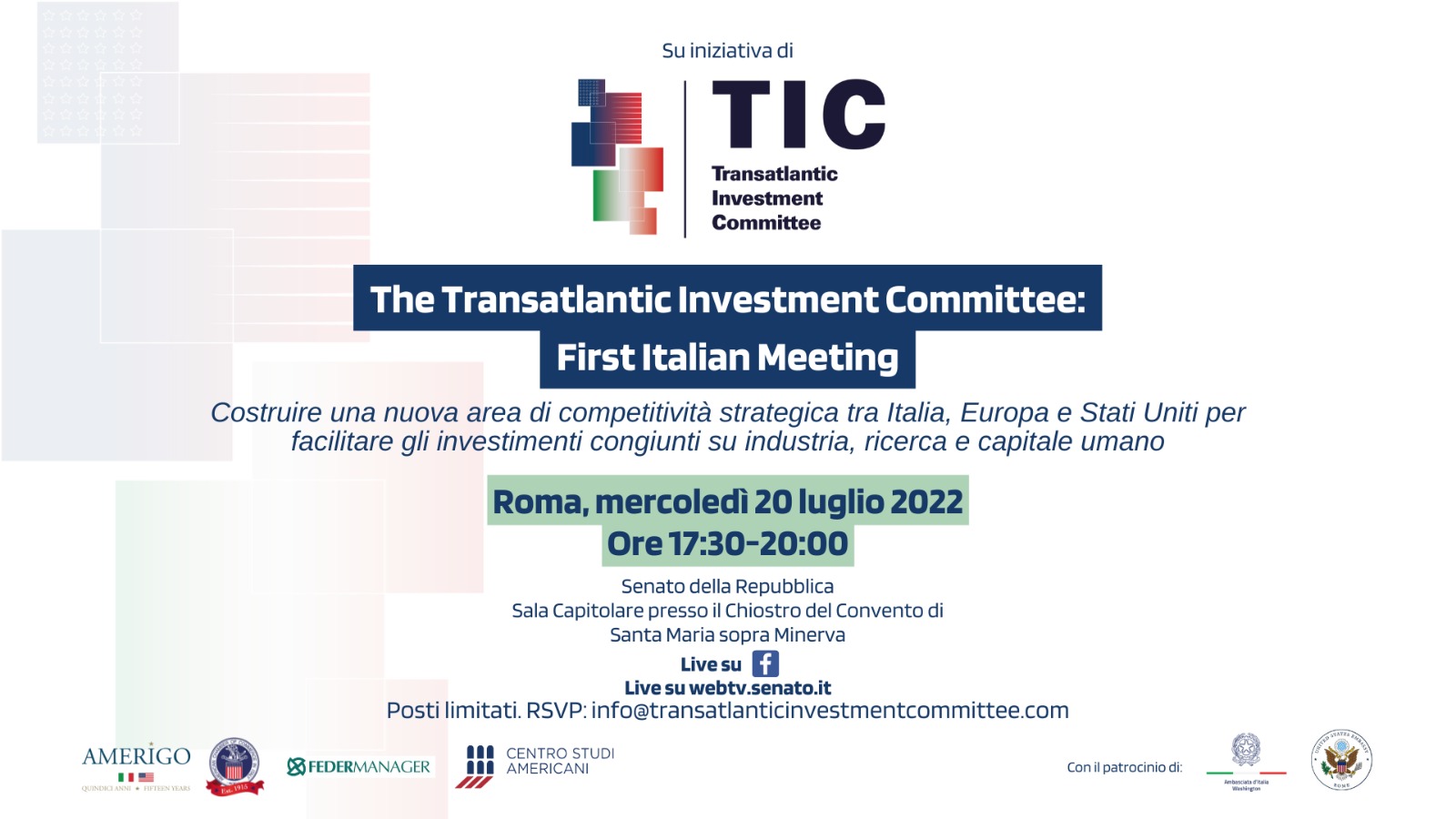STRATEGIC WAY TO USA
Supporting Trade and Technology to Generate Industrial Connections
STRATEGIC HIGHER EDUCATION BY THE TRANSATLANTIC INVESTMENT COMMITTEE
STRATEGIC HIGHER EDUCATION BY THE TRANSATLANTIC INVESTMENT COMMITTEE
A higher education course aimed at strengthening the strategic collaboration with the USA, designed by the Federmanager Academy on behalf of the Transatlantic Investment Committee, inaugurated in October 2021 at the presence of the Italian Minister of Foreign Affairs and of the Heads of the Italian Embassy in Washington, DC and the of USA Diplomatic Mission in Italy. The Transatlantic Investment Committee was created on the initiative of the Amerigo Association, the American Chamber of Commerce in Italy, the Center for American Studies and Federmanager. The “STRATegic way to the USA: Supporting TRade and Technology to Generate Business and Networking” programme will start on May 3rd, with 15 sessions run by high-level spokespersons, mostly Americans or Italians living and working in the USA.
UNPRECEDENTED EXECUTIVE EDUCATION PROGRAM
More than highly specialized executive training, it’s a tool to become part of a select group of managers, businessmen, investors, professionals from the research system and institutions, interested in increasing the level of competitiveness of their realities, thanks to an effective partnership with the United States. The course takes its cue from the broader framework of the Trade and Technology Council, recently signed by the United States and the European Commission, and offers participants the opportunity to become part of a prestigious transatlantic community, thanks to which they will also be able to compare, according to a “hands-on” approach, the opportunities that may arise from the resources of the National Recovery and Resilience Plan and the Build Back Better program of the White House. The program will conclude at the end of October with an event at the Italian Embassy in Washington.
FORMAT AND TIMINGS
15 thematically focused training modules of 2 hours each, to which will be added a Q&A session of about 30 minutes. The time will always be from 17 to 19.30.
From 2 to 4 sessions/month, from May 3rd to October, therefore a monthly commitment of 5- 10 hours/month.

Bruxelles, 27 09 2022
Transatlantic Investment Committe – Bruxelles

Washington, 28 10 2022
Italian Embassy: closing of Course e
delivery of certificates.
Study Tour
Possibility of attending a Study Tour on American territory – if health restrictions allow it – reserved for those who will be the first to enroll in the course: the Study Tour will provide an exclusive path for a maximum of 30 participants, and early birds will have priority over others who have attended the course. The Study Tour is scheduled close to the Certificate Ceremony and has an additional fee.
Andrea Gumina, Senior Policy Advisor to the Italian Minister of Foreign Affairs and President of the Amerigo Association
May 3rd 2022, 5-7.30 PM CEST
Charles Bernardini, Nixon Peabody Law Firm Partner,
former Milan American Chamber of Commerce Managing Director and Chicago Italian Chamber of Commerce President
May 10th 2022, 5-7.30 PM CEST
Stephen Penman, Accounting Professor at the Columbia School of Business, Columbia
University, NYC
May 18th 2022, 5-7.30 PM CEST
Tim Baldenius, Columbia University, and Mascia Ferrari, Visiting Professor at the Stern
School of Business, New York University
May 24th 2022, 5-7.30 PM CEST
Alessandro Albicini, Bologna Albicini Law firm owner, international contract law expert, Chamber of Commerce and Association teacher
May 31st 2022, 5-7.30 PM CEST
Antonietta Demaio, Senior Legal Partner di TVLP Institute, San Francisco
June 7th 2022, 5-7.30 PM CEST
ADVANCED MODULES
These 9 sessions will largely follow the themes of the Working Groups as scheduled by the recent Pittsburgh Trade and Technology Council, with some additional points on the needs of enterprises. The names of the Lecturers are being defined, precisely because experts of exceptional value are being selected: for the state of the art of the Faculty, write to info@federmanageracademy.it.
The objective of this session is to illustrate the aspects that are strengthening European and US technology in areas such as radical innovation, Artificial Intelligence, increased connectivity, and issues related to emerging technologies considered of fundamental importance in the vision of the WTO: all this compared with what other realities with different value frameworks and alliances are doing, and seen from the perspective of synergies between the US and Europe.
The pandemic has only brought to the extreme consequences what was already a theme of vital importance for the exchange between the two sides of the Atlantic: a Supply Chain that, dispersed and often not rationalized, must become green and sustainable, lean and operational, digitized and therefore better dedicated to develop diversification and resilience of the chain itself. In particular, the focus will be on the Supply Chain in the production of semiconductors, as a strategic and crucial technological resource in many high value-added sectors.
This session aims to convey qualifying knowledge on the best use of
technologies to identify and solve climate problems and to develop the most effective Research & Development, also involving third countries, in order to make technologies less far from a “zero impact” on the Environment.
Another qualifying aspect, in this in-depth session, is the intention to explore
the use of methodologies and tools to reduce to zero, on a global level,
the emissions of greenhouse gases, the consumption of water and other natural resources. e 17-19,30
With a view to promoting inclusive economic growth that benefits people on both sides of the Atlantic, this session will address issues of funding for technologically advanced businesses and the U.S. entrepreneurial and managerial infrastructure in general. In fact, it is specifically about fostering inclusive growth for middle-class and low-income people, with a focus on the opportunities that such financing can generate for small and mediumsized enterprises (SMEs).
This session will address issues relevant to ensuring the security, diversity,
interoperability, and resilience of Information and Communications Technology and
Services (ICTS), including sensitive areas such as 5G, undersea cables, data centers, and cloud infrastructure. Useful topics for strengthening research and innovation cooperation for 5G and 6G systems will be addressed, thus ensuring that the European Union and the United States can develop a common vision and roadmap to prepare for the next generation of communications technologies that increase data security.
The first objective will be the commitment to oppose any arbitrary and illegal surveillance method, preventing its invasiveness towards the Atlantic countries; to protect human rights organizations in their online dimension; to prevent any attempt of data and information manipulation by foreign countries, while developing a reliable and accurate Artificial Intelligence, which is also a growth driver for companies.
In this session will be analyzed the best practices of evaluation of “dual-use” technologies
for the benefit of the two US-EU, the implementation of a system
of control of digital borders with special attention to emerging technologies, the
management of a correct and useful policy of protection of cross-investments.
Secondly, it will be examined the theme of Export to third countries, and the cases in which
sanctions are applied, with the ways to take appropriate measures to manage the impact of these in due time.
The main objective of this session is to transfer methodologies and tools to promote the access to Digital tools by those SMEs and Micro Enterprises that currently have a low degree of use of new digital technologies, and that risk losing competitiveness against competitors at the level of global opportunities.
This session sees the commitment of all stakeholders to focus on those market policies that are not free, but controlled by States, which prevent fair competition between economic and financial systems, imposing, among other things, duties, customs clauses or currency barriers. Emphasis is placed on tools to promote a proper policy of protection of workers’ rights, decent working conditions, and sustainable competition, fair and based on clear and transparent rules, as well as respected by all.


